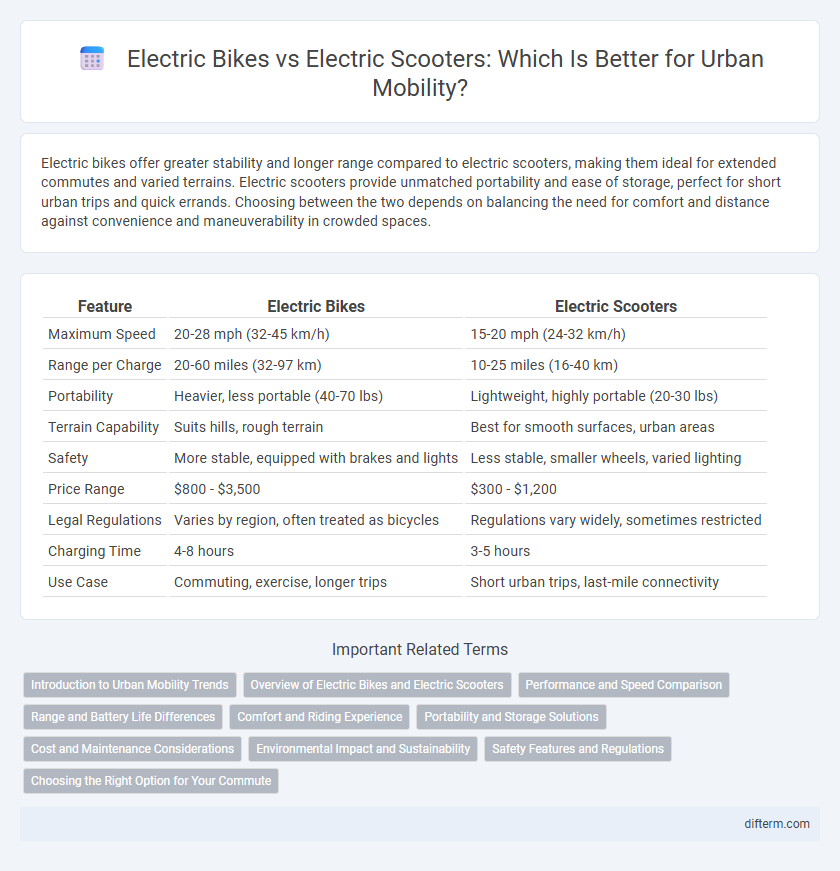Electric bikes offer greater stability and longer range compared to electric scooters, making them ideal for extended commutes and varied terrains. Electric scooters provide unmatched portability and ease of storage, perfect for short urban trips and quick errands. Choosing between the two depends on balancing the need for comfort and distance against convenience and maneuverability in crowded spaces.
Table of Comparison
| Feature | Electric Bikes | Electric Scooters |
|---|---|---|
| Maximum Speed | 20-28 mph (32-45 km/h) | 15-20 mph (24-32 km/h) |
| Range per Charge | 20-60 miles (32-97 km) | 10-25 miles (16-40 km) |
| Portability | Heavier, less portable (40-70 lbs) | Lightweight, highly portable (20-30 lbs) |
| Terrain Capability | Suits hills, rough terrain | Best for smooth surfaces, urban areas |
| Safety | More stable, equipped with brakes and lights | Less stable, smaller wheels, varied lighting |
| Price Range | $800 - $3,500 | $300 - $1,200 |
| Legal Regulations | Varies by region, often treated as bicycles | Regulations vary widely, sometimes restricted |
| Charging Time | 4-8 hours | 3-5 hours |
| Use Case | Commuting, exercise, longer trips | Short urban trips, last-mile connectivity |
Introduction to Urban Mobility Trends
Electric bikes and electric scooters have rapidly transformed urban mobility by offering eco-friendly, efficient alternatives to traditional transportation. Cities worldwide report increased adoption of these electric vehicles, which reduce traffic congestion and lower carbon emissions. Integration with public transit systems highlights their growing role in smart, sustainable urban transportation networks.
Overview of Electric Bikes and Electric Scooters
Electric bikes feature a pedal-assist mechanism powered by a rechargeable battery, allowing riders to cover longer distances with less physical effort, ideal for commuting and exercise. Electric scooters operate primarily with a throttle and a smaller deck, offering compactness and ease of use for short urban trips and quick errands. Both vehicles contribute to sustainable mobility by reducing carbon emissions and traffic congestion in city environments.
Performance and Speed Comparison
Electric bikes typically offer higher speeds than electric scooters, with average top speeds ranging from 20 to 28 mph, compared to scooters' 15 to 20 mph. In terms of performance, electric bikes provide better hill-climbing ability and longer battery range, often exceeding 40 to 60 miles per charge, while most electric scooters average 15 to 30 miles. The combination of pedal assistance and larger motors in electric bikes enhances acceleration and sustained speed, making them more versatile for varied terrains and longer commutes.
Range and Battery Life Differences
Electric bikes typically offer a longer range than electric scooters, with averages spanning 40 to 70 miles per charge compared to scooters' 15 to 30 miles. Battery life in electric bikes benefits from higher-capacity lithium-ion cells, often rated between 400 to 700 watt-hours, while scooters usually have smaller batteries ranging from 200 to 400 watt-hours. The enhanced battery capacity and energy efficiency in e-bikes contribute to extended travel distances and longer-lasting performance on a single charge.
Comfort and Riding Experience
Electric bikes offer superior comfort with ergonomic seating and suspension systems that reduce fatigue during long rides, making them ideal for extended commutes. Electric scooters provide a more compact and agile riding experience but often lack the cushioned seating and stability of e-bikes, which can result in a less comfortable ride on uneven terrain. Riders seeking a smoother and more supportive journey typically prefer electric bikes for their enhanced ergonomics and shock absorption.
Portability and Storage Solutions
Electric bikes typically have larger frames and heavier weights, making portability and compact storage more challenging compared to electric scooters, which are designed to be lighter and foldable for easy carrying. Electric scooters often feature quick-fold mechanisms and smaller footprints, allowing them to fit conveniently in tight spaces such as office lockers, car trunks, or under desks. Storage solutions for electric bikes generally require dedicated bike racks or wall mounts, whereas electric scooters can be stored more flexibly in apartments or public transport compartments.
Cost and Maintenance Considerations
Electric bikes generally have higher upfront costs ranging from $700 to $3,500, while electric scooters typically cost between $300 and $1,200. Maintenance for electric bikes involves periodic brake adjustments, tire replacements, and battery care, whereas electric scooters often require less frequent but more specialized repairs to electronic components and smaller tires. Considering long-term durability, electric bikes tend to offer better value with lower overall maintenance expenses compared to electric scooters.
Environmental Impact and Sustainability
Electric bikes generate significantly lower carbon emissions compared to electric scooters due to their higher energy efficiency and longer lifespan of components, reducing overall environmental impact. Electric bikes often use recyclable materials and feature batteries with greater capacity and longevity, promoting sustainability in urban transportation. Choosing electric bikes over scooters can contribute to decreased air pollution and resource consumption, aligning with green mobility goals.
Safety Features and Regulations
Electric bikes often incorporate advanced safety features such as integrated lights, reflectors, and robust braking systems, designed to meet stringent regulations like the European Union's EN15194 standard. Electric scooters, while agile, typically have limitations in lighting and protective gear requirements, with regulations varying widely by region, often mandating helmet use and speed restrictions. Understanding these regulatory frameworks is critical for ensuring compliance and rider safety, particularly in urban environments where traffic interactions are frequent.
Choosing the Right Option for Your Commute
Electric bikes offer a longer range and higher speed, making them ideal for longer commutes and varied terrains, while electric scooters excel in portability and ease of storage for shorter, urban trips. Considering factors like commute distance, road conditions, and storage space helps determine the best option for individual needs. Battery life, weight, and local regulations also play crucial roles in selecting between electric bikes and scooters for daily mobility.
electric bikes vs electric scooters Infographic

 difterm.com
difterm.com